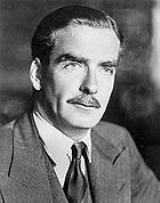
Anthony Eden
Robert Anthony Eden, 1st Earl of Avon, KG, MC, PC (1897-06-12 – 1977-01-14), British politician, was Foreign Secretary during World War II and Prime Minister of the United Kingdom from 1955 to 1957.
Sourced
- I do not believe that we can make progress in European appeasement if we allow the impression to gain currency abroad that we yield to constant pressure. I am certain in my own mind that progress depends above all on the temper of the nation, and that temper must find expression in a firm spirit. This spirit I am confident is there. Not to give voice it is I believe fair neither to this country nor to the world.
- Speech to the House of Commons detailing his resignation from the government as Foreign Secretary (21 February, 1938).
- Mr. Greenwood, when moving the Amendment yesterday, told us that the war would shake many strongly held views. I fear that this war will do very much more than that. The war will bring about changes which may be fundamental and revolutionary in the economic and social life of this country. On that we are all agreed.
- Speech to the House of Commons (6 December, 1939).
- If you drive a nation to adopt procedures which run counter to its instincts, you weaken and may destroy the motive force of its action...You will realise that I am speaking of the frequent suggestion that the United Kingdom should join a federation on the continent of Europe. This is something which we know, in our bones, we cannot do...For Britain's story and her interests lie far beyond the continent of Europe. Our thoughts move across the seas to the many communities in which our people play their part, in every corner of the world. These are our family ties. That is our life: without it we should be no more than some millions of people living in an island off the coast of Europe, in which nobody wants to take any particular interest.
- Speech to the Columbia University, New York, in January 1952. (Anthony Eden, Full Circle (Cassell, 1960), pp. 36-7.)
- Our quarrel is not with Egypt, still less with the Arab world. It is with Colonel Nasser. He has shown that he is not a man who can be trusted to keep an agreement. Now he has torn up all his country's promises to the Suez Canal Company and has even gone back on his own statements.
- "Oil route 'a matter of life and death'", The Times, 9 August 1956, p. 6.
- Broadcast, 8 August 1956.
- We cannot agree that an act of plunder which threatens the livelihood of many nations should be allowed to succeed.
- Conclusion of broadcast, 8 August 1956.
- There is now doubt in our minds that Nasser, whether he likes it or not, is now effectively in Russian hands, just as Mussolini was in Hitler's. It would be as ineffective to show weakness to Nasser now in order to placate him as it was to show weakness to Mussolini.
- Eden to President Eisenhower (1 October, 1956).
- All my life, I've been a man of peace, working for peace, striving for peace, negotiating for peace. I've been a League of Nations man and a United Nations man and I'm still the same man with the same convictions, the same devotion to peace. I couldn't be other even if I wished. But I'm utterly convinced that the action we have taken is right.
- BBC television broadcast to the nation (3 November, 1956).
- If we had allowed things to drift, everything would have gone from bad to worse. Nasser would have become a kind of Moslem Mussolini, and our friends in Iraq, Jordan, Saudi Arabia, and even Iran would gradually have been brought down. His efforts would have spread westwards, and Libya and North Africa would have been brought under his control.
- Eden to Eisenhower (5 November, 1956).
- It has had the effect of making us the 49th state [of America].
- On Harold Macmillan's government policies, to Lord Salisbury (28 December, 1957).
- Although [in 1937] we might still hope to prevent the divisions of Europe into Fascist and anti-Fascist camps, our real affinities and interests, strategic as well as political, lay with France, a fact which some of my colleagues were most reluctant to realise.
- Anthony Eden, The Eden Memoirs: Facing the Dictators (Cassell, 1962), pp. 486-7.
- Il serait impertinent pour un pays n’ayant pas subi l’occupation de porter un jugement sur un autre l’ayant subi.
- It would be impertinent for a country that has not suffered occupation to pass judgment on one that did.)
- On the occupation of France, in an interview in the film Le chagrin et la pitié, 1971.
About
- I never saw a better dressed fool.
- Benito Mussolini in spring 1935. Quoted in Piers Brendon, The Dark Valley (2000), p. 271.
- Eden ha[s] put his country in a position where she sustained the greatest diplomatic reverse since Bismarck in similar circumstances had called Palmerston's bluff in the matter of Schleswig-Holstein...Further damage was done when Russia proved by her action in Spain, that she was not a good European as Mr. Eden had assured the world was the case.
- Sir Charles Petrie, Lords of the Inland Sea (Lovat Dickson Ltd, 1937), pp. 272-6.
- Anthony's father was a mad baronet and his mother a very beautiful woman. That's Anthony—half mad baronet, half beautiful woman.
- R. A. Butler quoted in Patrick Cosgrave, R.A. Butler (1981), p. 12.
